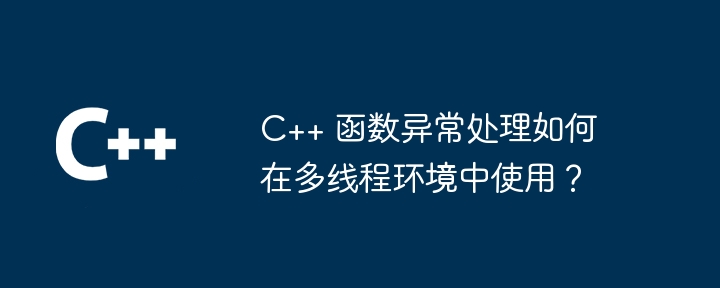
Using C exception handling in a multi-threaded environment requires caution to avoid thread safety issues. C provides several mechanisms to solve this problem: Thread-local storage (TLS): Each thread has a private copy of the exception. No exception specification: Disables exception stack unwinding and immediately rethrows exceptions. Collaborative exception handling: Threads actively participate in exception delivery and handling.

Usage of C function exception handling in multi-threaded environment
When using C function exception handling in multi-threaded environment, Special attention needs to be paid to thread safety issues. Because threads can execute concurrently, if an exception raised by one thread is not handled correctly, it may cause the entire program to crash or its data to be corrupted.
C provides some mechanisms to handle exceptions in multi-threads:
1. Thread Local Storage (TLS)
TLS allows each Threads have their own private copies of data, thus avoiding competition for shared data between threads. You can use TLS to store exception information so that each thread can access the exceptions it throws.
2. No exception specification
The no exception specification allows a function to disable exception handling when executing. This means that if an exception occurs in a function, it is not unwound on the stack but is immediately re-thrown to the caller. This prevents exceptions from leaking to other threads.
3. Collaborative exception handling
Collaborative exception handling requires threads to actively participate in exception handling. When a thread throws an exception, it must pass the exception to other threads so it can be handled. This prevents exceptions from accidentally terminating other threads.
Practical Case
Consider the following code, which uses TLS to handle exceptions in a multi-threaded environment:
#include <iostream>
#include <thread>
#include <exception>
using namespace std;
thread_local exception_ptr exception_ptr_local; // TLS 异常指针
void thread_function() {
try {
// 执行可能会引发异常的代码
throw runtime_error("Custom error message");
} catch (...) {
// 将异常信息存储在 TLS 中
exception_ptr_local = current_exception();
}
}
int main() {
thread t(thread_function);
t.join();
// 检查是否存在存储在 TLS 中的异常
if (exception_ptr_local) {
try {
rethrow_exception(exception_ptr_local);
} catch (exception& e) {
// 在主线程中处理异常
cout << "Exception occurred in thread: " << e.what() << endl;
}
}
return 0;
}In this example, thread_function May throw an exception during execution. If an exception is thrown, it is caught and stored in the TLS variable exception_ptr_local. The main thread can then retrieve and handle the exception from TLS.
C function exception handling can be used safely in a multi-threaded environment by using appropriate mechanisms. This can help prevent exceptions from accidentally terminating other threads and keep your program robust.
The above is the detailed content of How is C++ function exception handling used in a multi-threaded environment?. For more information, please follow other related articles on the PHP Chinese website!
 What are the differences between c++ and c language
What are the differences between c++ and c language
 Recommended learning order for c++ and python
Recommended learning order for c++ and python
 Cost-effectiveness analysis of learning python and c++
Cost-effectiveness analysis of learning python and c++
 Is c language the same as c++?
Is c language the same as c++?
 Which is better to learn first, c language or c++?
Which is better to learn first, c language or c++?
 The difference and connection between c language and c++
The difference and connection between c language and c++
 C++ software Chinese change tutorial
C++ software Chinese change tutorial
 Cost-effectiveness analysis of learning python, java and c++
Cost-effectiveness analysis of learning python, java and c++




